Kintsugi Experience: Art of Golden Joinery in Tokyo
Step into the world of Kintsugi in Tokyo and discover the art of golden joinery that transcends mere pottery repair. As participants don the traditional samue attire and enjoy the tranquil setting of the TNCA Minami-Aoyama Studio, they are poised to uncover the intricate techniques of this ancient craft.
Each crack mended with gold lacquer speaks volumes about embracing imperfections and finding beauty in the mended. Stay tuned to learn more about the transformative journey that awaits in the heart of Tokyo’s artistic landscape.
Key Points
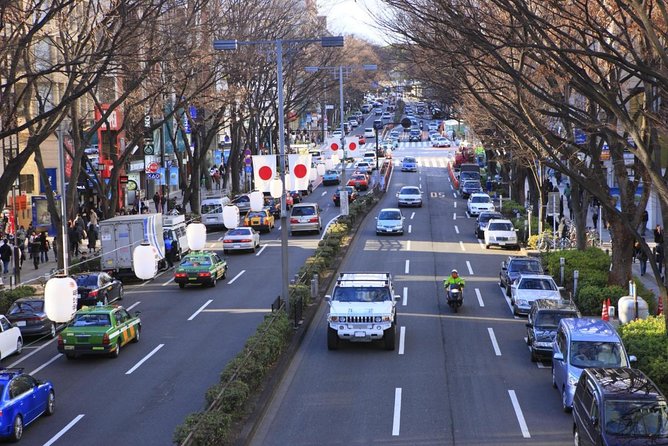
- Learn Kintsugi, the art of repairing pottery with gold lacquer, embracing Japanese philosophy of valuing repair.
- Wear traditional samue work clothes and take home a repaired pottery item as a unique souvenir.
- Gain insights into Japanese aesthetics and culture through creating a unique ceramic plate.
- Experience a small group lesson at TNCA Minami-Aoyama Studio in Tokyo, with hotel pickup and drop-off included.
Kintsugi Art: Repairing With Gold Lacquer
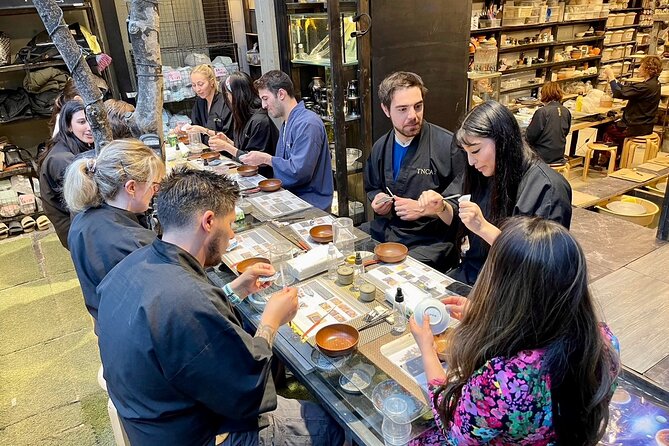
When delving into the art of Kintsugi, individuals enjoy the intricate process of repairing pottery using lacquer infused with shimmering gold. This traditional craftsmanship involves a meticulous approach to mending broken ceramics, where cracks are highlighted with the radiant gold lacquer, creating a striking visual contrast that tells the story of the object’s history.
Through this artistic transformation, what was once considered damaged becomes a unique piece, celebrating imperfections rather than disguising them. The act of repairing with gold lacquer not only restores the pottery’s function but also elevates it to a new level of beauty, embodying the Japanese philosophy of embracing flaws and impermanence. Kintsugi truly exemplifies the art of turning brokenness into a masterpiece.
Embracing Japanese Philosophy in Tokyo
Exploring the essence of Japanese philosophy in Tokyo unveils a profound connection to the art of Kintsugi, where the practice of valuing imperfections and embracing the beauty of repair resonates deeply within the cultural fabric of the city. This philosophical approach extends beyond pottery mending, influencing various aspects of daily life and arts in Tokyo.
To truly take in Japanese philosophy while in Tokyo, consider the following:
- Wabi-Sabi: Embrace impermanence and imperfection.
- Mono no Aware: Appreciate the beauty of transience.
- Mujo: Acknowledge the inevitability of change and the impermanence of all things.
- Esho Funi: Understand the inseparability of life and environment in harmony.
Samue Work Attire and Pottery Repair
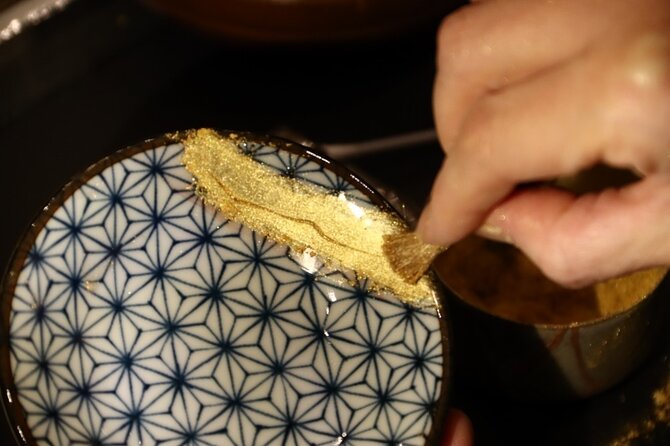
Donning traditional samue work attire sets the tone for a hands-on experience in the intricate art of pottery repair known as Kintsugi in Tokyo. The samue fashion not only adds to the authenticity of the experience but also enhances the connection to Japanese craftsmanship techniques.
Participants clad in these comfortable and practical work clothes are guided through the delicate process of repairing pottery using lacquer mixed with gold. The attire allows for ease of movement essential for mastering the meticulous art form.
Embracing the samue attire not only immerses individuals in the traditional aspect of the craft but also aligns with the ethos of valuing repair and honoring the history of Kintsugi.
Take-Home Souvenir and Aesthetic Appreciation
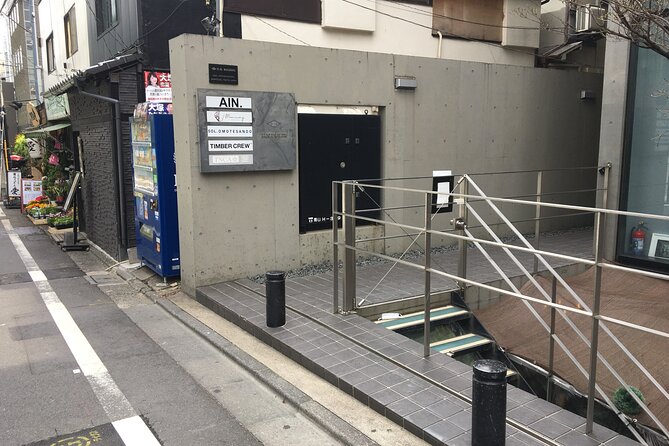
Participants in the Kintsugi Experience in Tokyo not only learn the art of repairing pottery with lacquer mixed with gold but also leave with a unique souvenir that embodies the beauty of Japanese aesthetics. The Kintsugi souvenir serves as a tangible reminder of their experience, showcasing the transformation of brokenness into something exquisite.
Here are four reasons why this souvenir holds significance:
-
Symbol of Resilience: The mended pottery piece symbolizes strength and resilience in the face of adversity.
-
Cultural Connection: It represents a deep connection to Japanese culture and traditions.
-
Personalized Artwork: Each piece is unique, reflecting the participant’s individual journey and artistic expression.
-
Aesthetic Beauty: The shimmering gold seams highlight the beauty of imperfection and impermanence in a visually striking manner.
Meeting Details and Studio Experience
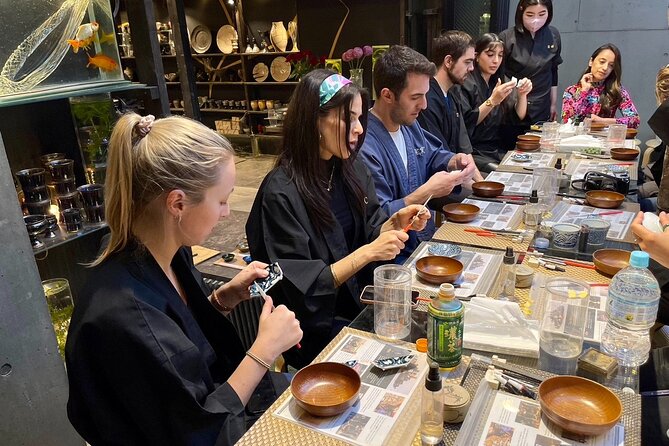
Upon arrival at the TNCA Minami-Aoyama Studio in Tokyo, visitors are welcomed into a serene space where they’ll embark on their immersive Kintsugi experience.
The studio offers a guided tour, allowing participants to explore the traditional Japanese craftsmanship tools and materials used in the art of golden joinery. During the hands-on session, guests engage in a culture, learning the ancient techniques of Kintsugi under the guidance of skilled artisans.
The experience includes wearing traditional samue work clothes, enhancing the authenticity of the encounter. As part of the studio experience, individuals get to witness firsthand the beauty of golden repair work and gain a deeper appreciation for Japanese aesthetics and the philosophy of valuing repair over disposal.
Common questions
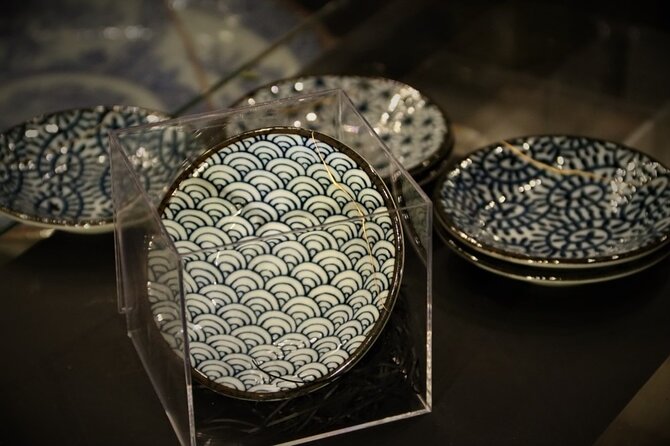
Can Children Participate in the Kintsugi Experience, or Is It Limited to Adults Only?
Children aged 10 and above can participate in the Kintsugi workshop, making it a family-friendly activity. There is no strict age limit for this experience, offering youth the chance to engage in traditional Japanese craftsmanship alongside adults.
Is There a Minimum Age Requirement for Participants in the Kintsugi Workshop?
Age restrictions apply to the Kintsugi workshop. Parental guidance is essential for participants under a certain age. The experience fosters appreciation for Japanese culture and craftsmanship, welcoming individuals of various ages to join in this enriching activity.
Are There Any Specific Types of Pottery Items That Participants Can Bring to Repair During the Class, or Are Ceramic Plates Provided for Everyone?
Participants in the Kintsugi workshop can bring their personal types of pottery items, or use the provided ceramic plates. This allows for a personal touch in the repair process and ensures a unique souvenir to take home.
Are There Any Restrictions on the Design or Size of the Repaired Pottery Items That Participants Can Take Home as Souvenirs?
Design restrictions and size limitations are minimal, allowing participants to express their creativity. They can take home a uniquely repaired pottery item, showcasing their personal touch. The experience fosters individuality and appreciation for the art form.
Is Prior Experience in Pottery or Craftsmanship Required to Fully Enjoy and Participate in the Kintsugi Workshop?
Prior experience in pottery or craftsmanship isn’t required for the Kintsugi workshop. Participants of all skill levels can enjoy learning the art of golden joinery. The workshop dynamics encourage creativity as individuals craft their unique ceramic items.
Last Words
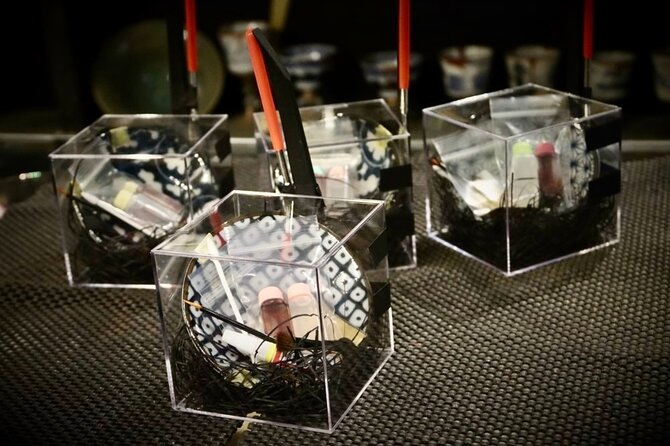
Enjoy the art of Kintsugi in Tokyo and discover the beauty of imperfections through golden joinery. Embrace Japanese philosophy, don traditional samue attire, and learn the intricate techniques of pottery repair with lacquer mixed with gold.
Take home a beautifully repaired pottery item as a souvenir and gain a newfound appreciation for Japanese aesthetics and craftsmanship.
Join a small group for this captivating cultural experience at TNCA Minami-Aoyama Studio.